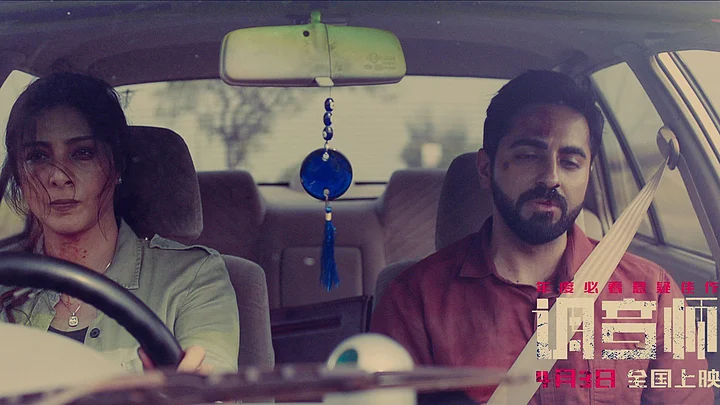For starters, Sriram Raghavan’s AndhaDhun (released as Piano Player in China) was widely publicised on WeChat and Weibo even before it released in China. There were two main points of discussion during that time:
- First, that AndhaDhun was adapted from a 14-minute French short film (L'Accordeur), which has been expanded into an Indian film of over 2 hours. Film critics in China had pointed out that the story at core of the French short film was widely acclaimed, so the Indian adaptation was likely to already have a solid story as well and this pricked the curiosity and interest of Chinese film goers.
- Secondly, it was assumed that the adapted script would have plenty of local elements from India to extend the original French story, which would make the Indian film much more attractive to watch. AndhaDhun, naturally ticked all these boxes.
(Too busy to read? Listen to this story instead.)
Another feature that made Andhadhun stand out was that it had received a very high rating online after being released in North America. Several articles in China mentioned that IMDB gave the thriller a high rating of 8.8.
This not only vouched for the quality of the film, but also showed that the Indian film had been recognised by the North American market.
The Chinese have always wanted to take the international route to try and spread Chinese traditional culture and thoughts through their films. However, there have hardly been any Chinese films that have entered the international market successfully, especially in the suspense or thriller genre. So, Andhadhun’s recognition in North America attracted the attention and interest of Chinese fans.
What’s more, as soon as Andhadhun released in China, the Chinese film rating website Maoyan rated the film with a high 9.2 points, while the more rigorous Douban gave it 8.3 (any film scoring 8 points or more is regarded as excellent).
The popularity of Andhadhun in China was also because of the following aspects: Suspense films are hugely popular among the Chinese audience but many of the suspense thrillers made in China don’t make the cut of being a good film. The problem with most Chinese thrillers is that they simply try to be different for the sake of being different at the cost of being flawed, illogical with a script riddled with several loopholes. As a result, the audience comes out of the theatre with the film having had no impact on them.
In comparison, Andhadhun is a winner in both aspects. Even if you dissect the story and script of Andhadhun after multiple viewings there is no logical flaw in the otherwise complicated plot. The film uses flashbacks to develop several moments filled with suspense. The story is wound in such a way that it ends right where it all began. The structure is rich and packed with various elements like a rabbit, horror masks and the last shot of the can which is a masterstroke.
A noted Chinese film critic observed, “As a suspense film, Andhadhun does not rely on any hot topic or feelings or national customs to attract eye balls, but relies mostly on the excellence of the script and the finesse of film production”. It’s little surprise then that the Chinese audience welcomed a film like Andhadhun with open arms.
As someone commented, “The end of the film (Andhadhun) is not the end, but the beginning of thinking.” The thriller leaves you with many questions and keeps your mind buzzing with all the open ended possibilities after the end credits roll.
Each character in Andhadhun seems to represent a certain type of person in reality, including the hero (Ayushmann Khurrana) who pretends to be blind to pursue music, but eventually become morally blind. The child in the neighbourhood represents greedy and indifferent, social groups; the police officer (Manav Vij) who represents the menacingly powerful and corrupt of the society; the girlfriend (Radhika Apte) of hero who represents the section that is easily-influenced. The plot of selling organs in the film also reveals the reality of illegal trafficking of organs in India. These social groups and concerns were also echoed by the Chinese audience.
Over the years, several Indian films such as 3 Idiots, PK and Dangal have been hugely appreciated by Chinese fans and there has also been an evolution in the understanding of Indian cinema amongst the audience here. At first, the Chinese audience thought that Indian films were full of songs, dances and various exaggerated moments. Later, they realised that Indian films could also tell emotional stories with a human touch. Now, Andhadhun has once again won the hearts of the Chinese audience with its characteristics of being a superbly told suspense thriller.
It is being reported that Andhadhun has collected more money at the box-office in China than it did in India. But this may partly also be because the average price for a movie ticket in China is higher than what it is in India.
For example, in 2016, the average price of a movie ticket in India was Rs 47, which is far lower than the average price of a ticket in China that’s 33 Yuan, which is about Rs 330 in China.
Thanks to the popularity of Indian cinema, the Chinese people have a new understanding of their neighbours. With the increasing distribution and exhibition of Indian films here, not only is the Chinese audience evolving in their appreciation and acceptance of Indian cinema, but the Indian film industry is also creating a huge loyal audience overseas for its films.
(Hu Xiaowen, is research fellow at Institute of Indian Studies, Yunnan University, China.)
(At The Quint, we question everything. Play an active role in shaping our journalism by becoming a member today.)
